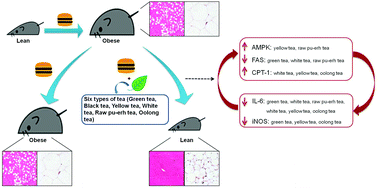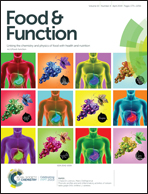Six types of tea reduce high-fat-diet-induced fat accumulation in mice by increasing lipid metabolism and suppressing inflammation†
Abstract
A high-fat diet results in obesity because of white fat accumulation. Although tea extracts alleviate lipid metabolism disorders and decrease white fat accumulation, the mechanisms underlying the therapeutic actions of different types of Chinese tea are unclear. We established a murine model of obesity by feeding mice with a high-fat diet (HFD) and treating them with atorvastatin (positive control) or water extracts (WEATs) of different tea types. The food and water intake, body weight gain, white fat accumulation, and triglyceride (TG) and total cholesterol (TC) levels were evaluated to assess the effects of the WEATs on obesity. The levels of the lipid metabolism enzymes p-AMPK, CPT-1A and FAS and the pro-inflammatory factors iNOS and IL-6 were determined. The WEATs not only reduced the body weight and white fat accumulation in the HFD-induced obese mice, but also relieved hepatic steatosis. Comparing the effects of the six kinds of tea showed that white tea has the best anti-obesity effect. Yellow tea and raw pu-erh tea significantly up-regulated p-AMPK, green tea, white tea and raw pu-erh tea markedly inhibited FAS, and white tea, yellow tea and oolong tea up-regulated CPT-1. Therefore, it is possible that white tea, yellow tea and oolong tea inhibit obesity by increasing energy expenditure and fatty acid oxidation, while green tea, white tea and raw pu-erh tea exert their effects by inhibiting fatty acid synthesis. In addition, the WEATs also significantly decreased the levels of IL-6, while green tea, yellow tea and oolong tea significantly inhibited iNOS. Different types of tea have specific chemical compositions and can regulate different lipid metabolism related proteins. In conclusion, despite variations in its composition and mechanism of action, tea is a potent anti-obesity agent.



 Please wait while we load your content...
Please wait while we load your content...